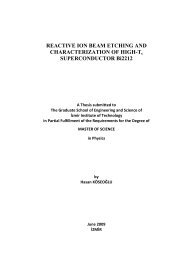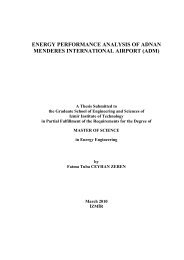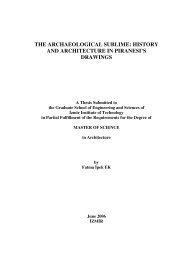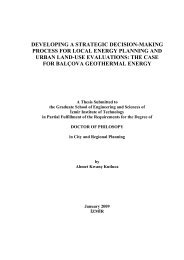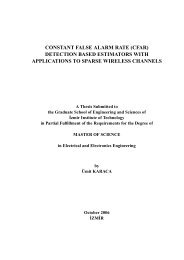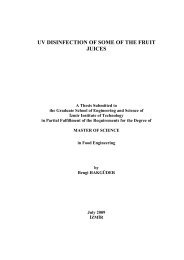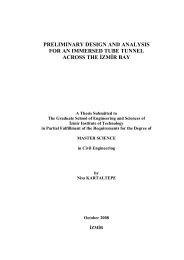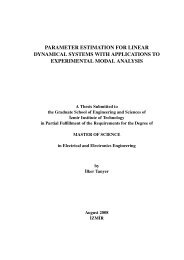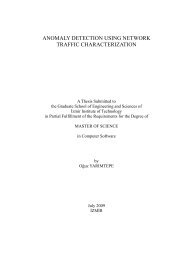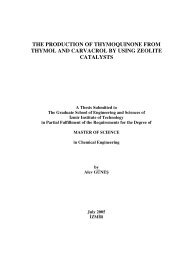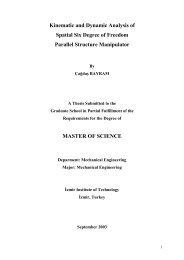a critical evaluation on the concept of justice in planning process
a critical evaluation on the concept of justice in planning process
a critical evaluation on the concept of justice in planning process
Create successful ePaper yourself
Turn your PDF publications into a flip-book with our unique Google optimized e-Paper software.
decisi<strong>on</strong>s that are passed <strong>on</strong> <strong>the</strong> basis <strong>of</strong> “benefits” menti<strong>on</strong>ed <strong>in</strong> <strong>the</strong> c<strong>on</strong>text <strong>of</strong> <strong>the</strong><br />
urban space.<br />
The arguments <strong>on</strong> <strong>the</strong> c<strong>on</strong>cept <strong>of</strong> <strong>justice</strong> <strong>in</strong> <strong>the</strong> <strong>process</strong> <strong>of</strong> juridical equity,<br />
judicial supervisi<strong>on</strong> can be evaluated <strong>in</strong> a comprehensive way. This k<strong>in</strong>d <strong>of</strong> way, dur<strong>in</strong>g<br />
<strong>the</strong> <str<strong>on</strong>g>evaluati<strong>on</strong></str<strong>on</strong>g> <strong>of</strong> whe<strong>the</strong>r or not a court resoluti<strong>on</strong> is <strong>in</strong> c<strong>on</strong>formity with <strong>the</strong> rules <strong>of</strong><br />
<strong>justice</strong> (equity), two different approaches can be adopted <strong>in</strong> <strong>the</strong> criticism <strong>of</strong> a court<br />
decisi<strong>on</strong> passed <strong>in</strong> c<strong>on</strong>necti<strong>on</strong> with a particular legal acti<strong>on</strong>.<br />
(a) Accord<strong>in</strong>g to <strong>the</strong> first approach, <strong>the</strong> exist<strong>in</strong>g rules <strong>of</strong> jurisprudence, <strong>in</strong> o<strong>the</strong>r words, <strong>the</strong><br />
positive law is taken for granted as given data. In this <str<strong>on</strong>g>evaluati<strong>on</strong></str<strong>on</strong>g>, whe<strong>the</strong>r or not a<br />
given court resoluti<strong>on</strong> was a “fair and just” resoluti<strong>on</strong>, is judged <strong>on</strong> <strong>the</strong> basis <strong>of</strong> a<br />
<str<strong>on</strong>g>critical</str<strong>on</strong>g> approach.<br />
“Was <strong>the</strong> litigati<strong>on</strong> <strong>process</strong> undertaken by an <strong>in</strong>dependent and objective organ that<br />
fully c<strong>on</strong>formed with <strong>the</strong> def<strong>in</strong>iti<strong>on</strong> <strong>of</strong> a “court?”,“Were <strong>the</strong> rules <strong>of</strong> law perta<strong>in</strong><strong>in</strong>g to<br />
<strong>the</strong> acti<strong>on</strong> def<strong>in</strong>ed and executed <strong>in</strong> an accurate manner by <strong>the</strong> court?”, “Were <strong>the</strong><br />
pers<strong>on</strong>s <strong>in</strong>volved <strong>in</strong> <strong>the</strong> acti<strong>on</strong> entitled to benefit fully from <strong>the</strong> rights provided to <strong>the</strong>m<br />
by <strong>the</strong> current rules <strong>of</strong> law dur<strong>in</strong>g <strong>the</strong> presentati<strong>on</strong> <strong>of</strong> <strong>the</strong>ir claims, or dur<strong>in</strong>g <strong>the</strong>ir<br />
defense?”, ”Were <strong>the</strong> testaments <strong>of</strong> <strong>the</strong> witnesses and o<strong>the</strong>r relevant evidence taken<br />
<strong>in</strong>to c<strong>on</strong>siderati<strong>on</strong> <strong>in</strong> due c<strong>on</strong>formity with <strong>the</strong> rules <strong>of</strong> law?” “Were <strong>the</strong> rules <strong>of</strong> law<br />
and <strong>the</strong> phenomena that are pert<strong>in</strong>ent to <strong>the</strong> subject matter <strong>of</strong> <strong>the</strong> litigati<strong>on</strong> evaluated<br />
accurately and c<strong>on</strong>sistently <strong>in</strong> <strong>the</strong> justificati<strong>on</strong> <strong>of</strong> <strong>the</strong> resoluti<strong>on</strong>?”<br />
It can be assumed that a given court is “just and fair”, if a positive resp<strong>on</strong>se can be<br />
given to each <strong>on</strong>e <strong>of</strong> <strong>the</strong> questi<strong>on</strong>s menti<strong>on</strong>ed above.<br />
In <strong>the</strong> sec<strong>on</strong>d approach, <strong>the</strong> <str<strong>on</strong>g>evaluati<strong>on</strong></str<strong>on</strong>g> <strong>of</strong> <strong>the</strong> subject matter exclusively <strong>in</strong> terms <strong>of</strong><br />
jurisprudence, is not deemed as adequate. In this approach, <strong>the</strong> positive law that puts a<br />
def<strong>in</strong>ite dist<strong>in</strong>cti<strong>on</strong> between <strong>the</strong> “right” and <strong>the</strong> “wr<strong>on</strong>g” is exceeded and a<br />
philosophical parameter is sought. This supreme parameter is “Justice”. In this<br />
approach, <strong>the</strong> fairness (equity) <strong>of</strong> <strong>the</strong> court decisi<strong>on</strong> is more important than its<br />
compliance with <strong>the</strong> rules <strong>of</strong> positive law.<br />
(b) From this perspective, even if it has been implemented accurately and appropriately, an<br />
<strong>in</strong>vestigati<strong>on</strong> is made <strong>in</strong> order to ascerta<strong>in</strong> whe<strong>the</strong>r or not a given rule <strong>of</strong> law is<br />
appropriate <strong>in</strong> <strong>the</strong> particular case, both <strong>in</strong> c<strong>on</strong>tent and <strong>in</strong> purpose.” (Aybay &<br />
Aybay,2003, pp. 69-70)<br />
In order for us to make an <str<strong>on</strong>g>evaluati<strong>on</strong></str<strong>on</strong>g> accord<strong>in</strong>g to <strong>the</strong> first approach, primarily,<br />
we have to take for granted that <strong>the</strong> parties who are <strong>in</strong>volved <strong>in</strong> <strong>the</strong> litigati<strong>on</strong> <strong>process</strong>;<br />
namely, <strong>the</strong> pla<strong>in</strong>tiff, legal attorneys <strong>of</strong> <strong>the</strong> pla<strong>in</strong>tiff, <strong>the</strong> defendant, <strong>the</strong> legal attorneys <strong>of</strong><br />
<strong>the</strong> defendant, <strong>the</strong> experts and <strong>the</strong> committee <strong>in</strong> charge <strong>of</strong> <strong>the</strong> court sessi<strong>on</strong>, are<br />
present<strong>in</strong>g <strong>the</strong>ir <str<strong>on</strong>g>evaluati<strong>on</strong></str<strong>on</strong>g>s exclusively from an objective standpo<strong>in</strong>t and <strong>in</strong> strict<br />
compliance with <strong>the</strong> legal <strong>process</strong>. This objectivity shall imply that as <strong>the</strong> c<strong>on</strong>cerned<br />
parties, all c<strong>on</strong>stituents shall alienate <strong>the</strong>mselves from <strong>the</strong>ir pers<strong>on</strong>al viewpo<strong>in</strong>ts<br />
regard<strong>in</strong>g <strong>the</strong> social phenomena, and from <strong>the</strong>ir subjective op<strong>in</strong>i<strong>on</strong>s and <str<strong>on</strong>g>evaluati<strong>on</strong></str<strong>on</strong>g>s. In<br />
can be argued that <strong>in</strong> an <str<strong>on</strong>g>evaluati<strong>on</strong></str<strong>on</strong>g> based <strong>on</strong> this understand<strong>in</strong>g, <strong>the</strong> litigati<strong>on</strong> matters<br />
are resolved with<strong>in</strong> <strong>the</strong> scope <strong>of</strong> a judicial <strong>process</strong> that adheres to <strong>the</strong> pr<strong>in</strong>ciple <strong>of</strong> equity,<br />
and <strong>in</strong> c<strong>on</strong>formity with <strong>the</strong> c<strong>on</strong>tents <strong>of</strong> <strong>justice</strong>, as def<strong>in</strong>ed <strong>in</strong> <strong>the</strong> positive law.<br />
179



